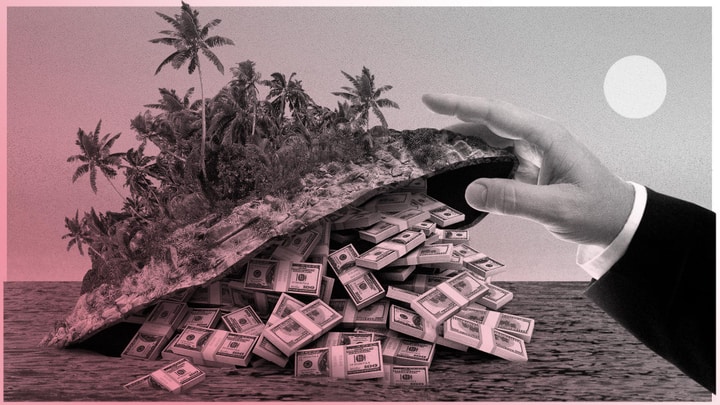How We Reported the Paradise Papers
The Paradise Papers are a new leak obtained by the Süddeutsche Zeitung. The data includes a total of 13.4 million documents – comprising around 1.4 terabytes – from two offshore service providers, Appleby and Asiaciti Trust, and from the company registers of 19 tax havens.
Where does the name Paradise Papers come from?
In contrast to the Panama Papers, many countries were involved in this data leak rather than a single country playing a central role. Because all of the places involved are so-called tax havens, or "tax paradises," the name Paradise Papers was chosen.
Where is the data from?
The documents were provided to the Süddeutsche Zeitung. Because of the need to protect its sources, the newspaper is unable to provide information regarding who supplied the papers or when and how they were leaked.
Did the Süddeutsche Zeitung pay for the data?
No. There was no money paid nor was any other form of compensation provided. The Süddeutsche Zeitung never pays for information.
The law firm Appleby says it was hacked. Is that true?
The Süddeutsche Zeitung is unable to verify this claim. The paper received the data through legal channels and evaluated them journalistically. The newspaper declines to take part in speculation as to how the data may have been obtained.
What is the difference between the Paradise Papers and the Panama Papers?
The two troves of documents differ in both source and content. In contrast to the Panama Papers, the present documents don't just contain information pertaining to politicians, athletes and the super-rich, but also to numerous multinational corporations that use the offshore system. Among Appleby's clients are companies like Nike, Apple, Facebook, Walmart, Allianz, Siemens, McDonald's and Yahoo.
Why were media outlets around the world able to report on the data that was provided to the Süddeutsche Zeitung?
Just as it did with the Panama Papers, the Süddeutsche Zeitung shared the data with the International Consortium of Investigative Journalists (ICIJ) in Washington so that other outlets could participate in the reporting. The Süddeutsche Zeitung alone would neither have been able to find nor report and publish all the stories from other countries. Important stories would have gone unreported and scandals wouldn't have been uncovered. The collaborative character of the reporting has resulted in additional and better stories – and more are coming.
How were the Paradise Papers analyzed?
The Paradise Papers consist of dozens of different data formats, including emails, PDFs, text documents, images and information from databases. To make sense of this tangle of data, the Süddeutsche Zeitung used the software Nuix, a program also used by international investigative authorities. The same program was used to evaluate the Panama Papers. The program makes it possible to easily search through all of the datasets and compare the data with lists of important people and companies. In addition, ICIJ made the data available to all of the media partners involved in the reporting on a platform programmed specifically for this project. That allowed journalists across the globe to work on the material around the clock.
Did the media outlets involved have to pay money to participate in the project?
No.
What is ICIJ and how is it financed?
Founded in 1997, ICIJ is a non-profit organization that can best be understood as an international association of investigative journalists. Some 200 journalists worldwide are members, including four Süddeutsche Zeitung reporters (Frederik Obermaier, Bastian Obermayer, Hans Leyendecker and Georg Mascolo). Until January 2017, ICIJ was part of the Center for Public Integrity (CPI), a non-profit organization in the United States for investigative journalism. CPI and ICIJ are financed by donations, recently including foundations in Australia, Britain, the Netherlands and the U.S. – from organizations like the Ford Foundation, the Adessium Foundation and the Open Society Foundation founded by George Soros. The Pulitzer Center on Crisis Reporting has also provided funding. In February 2017, ICIJ separated from CPI and is now an independent, non-profit media organization.
The Süddeutsche Zeitung has worked together with ICIJ since the fall of 2012 on projects such as Offshore Leaks, Luxembourg Leaks and Swiss Leaks. ICIJ has a significant amount of expertise and experience when it comes to the journalistic analysis of data and the sometimes-complicated coordination of international projects. In 2017, ICIJ received the Pulitzer Prize for the Panama Papers.
Can ICIJ donors, such as the billionaire George Soros, participate directly in the projects or even decide what is published and what is not published?
No. ICIJ informs its donors about the kind of reporting planned and, on a case by case basis, about the larger issues at hand, but never about specific stories. The partners involved in individual projects – in this case it was 97 media outlets – are completely independent in choosing the issues and stories they wish to pursue.
Do ICIJ supporters or donors appear in the Paradise Papers?
Yes. The billionaire investor George Soros uses Appleby to administer a network of offshore companies in places like the British Virgin Islands and Bermuda. The structure does not raise suspicions of illegality. Soros chose not to respond to requests for comment. Ebay founder Pierre Omidyar, whose foundation made a large donation to ICIJ a few months ago, is likewise the director of a company on the Cayman Islands that serves as an investment vehicle for his foundation. A spokeswoman said that Omidyar reports his investments to the tax authorities.
In the Panama Papers, readers had the impression that relatively few U.S. citizens appeared in the data. Is this data dump different?
Yes. Most of Appleby's clients are from the United States. Many important Americans make an appearance in the data, including Commerce Secretary Wilbur Ross, Secretary of State Rex Tillerson, former Commerce Secretary Penny Pritzker and retired General Wesley Clark.
Are all of the people and companies that appear in the Paradise Papers engaged in criminal activities?
No. Much of the activity documented in the data is legal – such as when multinational corporations use subsidiaries in tax havens to reduce the amount of profit they have to report. Private persons who set up an offshore company, report it to the authorities and tax its profits don't usually run into problems from the perspective of tax law.
If the establishment and maintenance of shell companies is broadly legal, why is it reported on?
Just because something is legal doesn't mean it is legitimate or uncontroversial. The fact that the national budgets of almost every country in the world lose out on billions each year through legal tax avoidance is in the obvious public interest and justifies coverage. It is money that could be used for hospitals, schools and roads. In 2016, then-U.S. President Barack Obama said: "The problem is that a lot of this stuff is legal, not illegal."
Have previous leaks had any effect?
Earlier revelations such as Offshore Leaks (2013), Lux Leaks (2014), Swiss Leaks (2015) and the Panama Papers (2016) have triggered discussions about the dangers associated with tax havens and obscure company structures. In addition, the number of newly established shell companies in various tax havens has fallen significantly. Panama has been particularly affected. In the European Parliament, several committees have focused especially on Lux Leaks and the Panama Papers. The effects of a particular journalistic investigation, however, should not be an indication of its value – many excellent investigations have not had larger consequences. The Panama Papers, though, changed a lot. Two prime ministers were forced to resign (in Iceland and Pakistan) and since their publication, there has been a European Union investigative committee and tighter laws in several countries, including Germany. In dozens of countries, investigations are currently underway into the owners of offshore companies. Such investigations can be protracted and they don't always result in convictions, often because the crimes involved have lapsed due to the statute of limitations.
Will the Süddeutsche Zeitung make the Paradise Papers available to the authorities?
The Süddeutsche Zeitung will not make the original documents or data available to the public or legal authorities. Doing so would be impossible for the simple reason that we need to protect our sources. It’s not inconceivable that there are clues in the data that might lead to the source: In 2017, the identity of a whistleblower in the U.S. was uncovered because an American journalist made one of the documents available externally. Furthermore, the Süddeutsche Zeitung isn't an accessory to state prosecutors or tax officials and working together with the state would violate journalistic principles. The state has plenty of means at its disposal to investigate problems revealed here.
Will the Süddeutsche Zeitung publish the names of all people mentioned in the Paradise Papers?
No. The Süddeutsche Zeitung will not publish all of the names that can be found in the Paradise Papers. For many of the companies and private individuals that appear in the data, there is no obvious public interest. Such an obvious public interest can be present when companies, even using legal methods, pay extremely low tax rates on large profits because they take advantage of offshore structures and when such cases exemplify tax iniquities or general societal shortcomings. An obvious public interest can also be present should there be clear cause for suspicion that a public figure has violated the law, such as through tax evasion. The Süddeutsche Zeitung and its German cooperation partners, the public broadcasters NDR and WDR, have only reported on cases where there is an obvious public interest.

